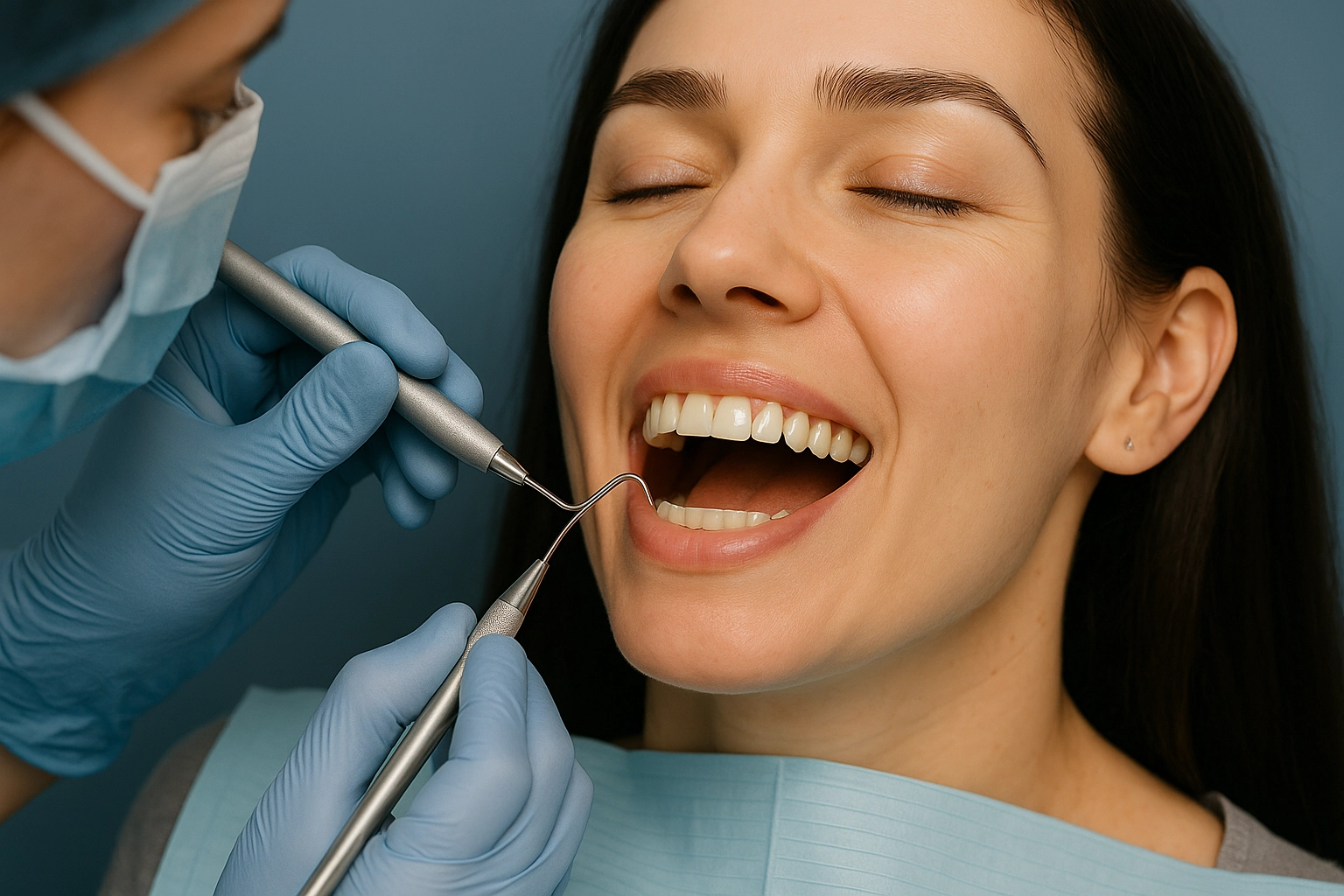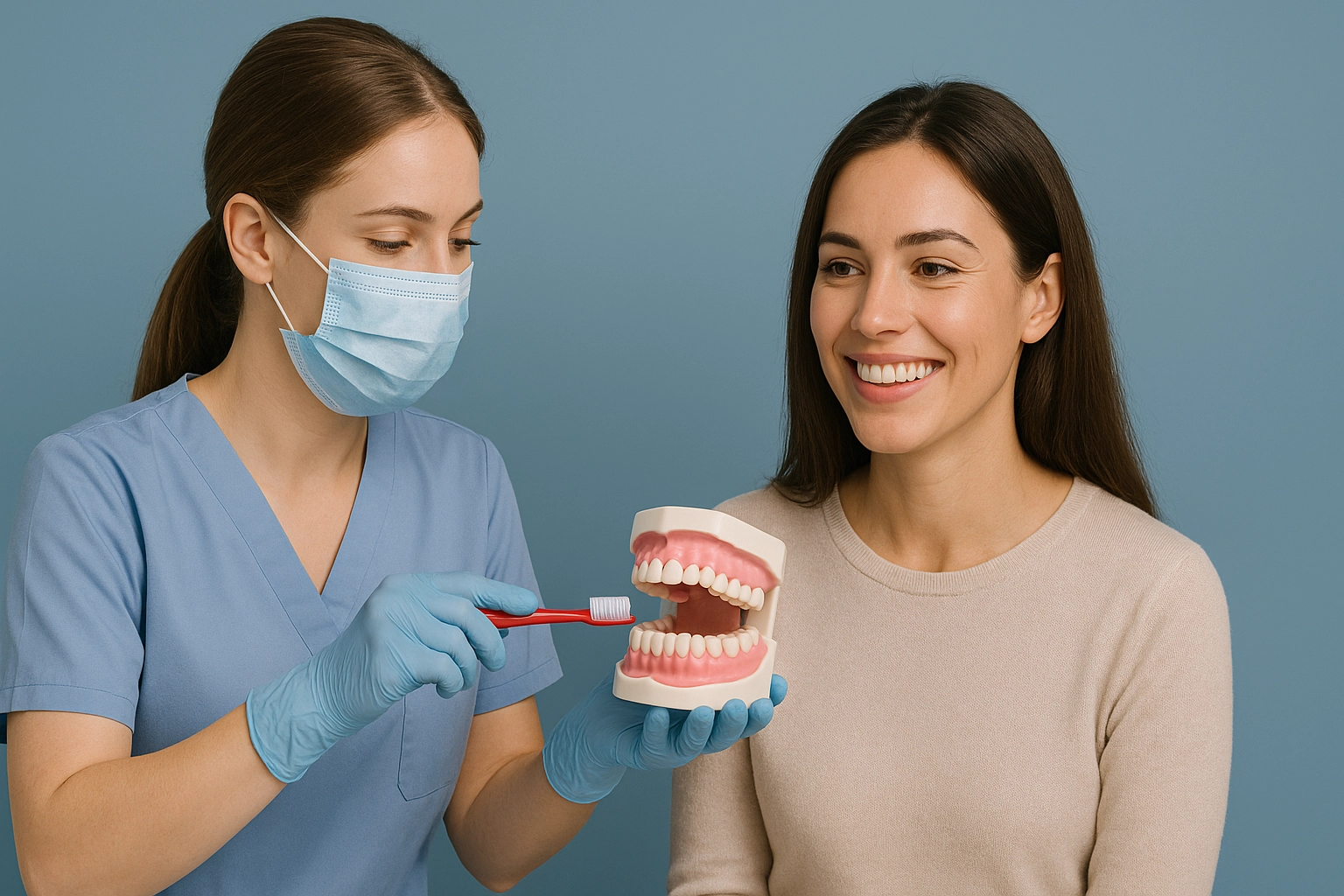
Why You Need to See Dental Hygienist in Brighton - Top 10 Reasons
Maintaining optimal oral health is essential not only for a radiant smile but also for overall well-being. While regular visits to your dentist are crucial, incorporating appointments with a dental hygienist into your oral care routine offers numerous benefits.
Dental hygienists specialize in preventive care, focusing on keeping your teeth and gums healthy and preventing potential dental issues.
In this comprehensive guide, we'll explore the top 10 reasons why seeing a dental hygienist in Brighton, UK is vital for your oral health.
1. Preventing Gum Disease: The Silent Threat
Gum disease, or periodontal disease, is a common yet often overlooked condition that can lead to tooth loss if left untreated. It begins with plaque buildup, which, if not removed, hardens into tartar, causing inflammation and infection of the gums.
Dental hygienists play a pivotal role in preventing gum disease. Through professional cleanings, they remove plaque and tartar from areas that are difficult to reach with regular brushing and flossing. Additionally, they provide guidance on effective oral hygiene practices to maintain healthy gums.
Early detection and intervention are key. Regular visits to your dental hygienist can help identify early signs of gum disease, allowing for prompt treatment and preventing progression to more severe stages.
2. Comprehensive Plaque and Tartar Removal

Even with diligent brushing and flossing, plaque can accumulate in hard-to-reach areas of the mouth. Over time, this plaque hardens into tartar, which cannot be removed by regular brushing alone.
Dental hygienists utilize specialized tools to perform scaling and polishing procedures, effectively removing plaque and tartar buildup. This not only helps in preventing cavities and gum disease but also contributes to fresher breath and a cleaner mouth feel.
Regular professional cleanings ensure that your teeth remain free from harmful deposits, promoting long-term oral health.
3. Early Detection of Oral Health Issues
Dental hygienists are trained to identify early signs of various oral health problems, including cavities, gum disease, and oral cancer. During routine cleanings, they conduct thorough examinations of your mouth, checking for abnormalities or changes that may indicate underlying issues.
Early detection is crucial in managing dental problems effectively. By identifying issues at an early stage, treatment can be less invasive, more cost-effective, and have a higher success rate.
Regular visits to your dental hygienist serve as an essential preventive measure, ensuring that any potential problems are caught and addressed promptly.
4. Oral Cancer Screening: A Critical Check
Oral cancer is a serious condition that can be life-threatening if not detected early. Dental hygienists are trained to perform oral cancer screenings during routine appointments, examining your mouth for signs of cancerous or precancerous conditions.
These screenings involve checking for unusual sores, lumps, or discolorations in the mouth and throat. Early detection significantly increases the chances of successful treatment and recovery.
Incorporating regular oral cancer screenings into your dental hygiene appointments is a proactive step in safeguarding your overall health.
5. Personalized Oral Hygiene Education

One of the key roles of a dental hygienist is to educate patients on proper oral hygiene practices tailored to their individual needs. They provide guidance on effective brushing and flossing techniques, recommend suitable dental products, and offer advice on dietary choices that impact oral health.
This personalized education empowers patients to take control of their oral health, leading to better outcomes and a reduced risk of dental problems.
By understanding the specific needs of your mouth, dental hygienists can help you establish an effective at-home oral care routine.
6. Enhancing Aesthetic Appeal: Brighter Smiles
A clean, bright smile contributes significantly to self-confidence and overall appearance. Dental hygienists help enhance the aesthetic appeal of your teeth by removing surface stains caused by food, beverages, and tobacco use.
Through professional polishing techniques, they can restore the natural whiteness of your teeth, giving you a more radiant smile. Additionally, maintaining regular hygiene appointments can prolong the results of cosmetic dental procedures.
Investing in your smile's appearance not only boosts confidence but also reflects a commitment to overall health and well-being.
7. Combatting Bad Breath (Halitosis)
Persistent bad breath, or halitosis, can be a source of embarrassment and social discomfort. Often, it results from the accumulation of plaque, tartar, and bacteria in the mouth.
Dental hygienists address this issue by thoroughly cleaning the teeth and gums, removing the buildup that contributes to unpleasant odors. They also provide advice on maintaining fresh breath through proper oral hygiene practices and dietary choices.
Regular hygiene appointments are an effective strategy in preventing and managing halitosis, ensuring confidence in social interactions.
8. Supporting Overall Health Through Oral Care

Oral health is closely linked to overall health, with research indicating connections between periodontal disease and systemic conditions such as heart disease, diabetes, and respiratory infections. By maintaining good oral hygiene, you can reduce the risk of these health issues.
Dental hygienists contribute to your overall health by preventing and managing oral diseases that may have systemic implications. Their role in early detection and education supports a holistic approach to health care.
Prioritizing oral health is an integral part of maintaining overall wellness and preventing chronic diseases.
9. Specialized Care for Dental Work Maintenance
If you’ve had dental restorations—such as crowns, bridges, veneers, or implants - routine care by a dental hygienist is essential for their longevity. These restorations can accumulate plaque and tartar around their margins, increasing the risk of gum disease or peri-implantitis.
Hygienists use gentle, precise tools to clean around these areas without damaging your dental work. They also monitor for early signs of complications like gum recession or inflammation, helping to prevent more serious issues.
Regular hygienist appointments help protect your investment and keep your smile both functional and aesthetically pleasing for years to come.
10. Cost-Effective Strategy for Long-Term Oral Health
Investing in preventive dental care by regularly visiting a dental hygienist is not only beneficial for your health but also economically wise. Addressing dental issues early can prevent the need for more extensive and costly treatments down the line.
For instance, the cost of a routine hygienist appointment is significantly lower than that of procedures like root canals, crowns, or dental implants, which may become necessary if oral health is neglected. By maintaining regular hygiene visits, you can avoid these expensive interventions and preserve your natural teeth for longer.
Moreover, good oral health contributes to overall well-being, potentially reducing medical expenses related to systemic conditions linked to poor dental hygiene. Thus, regular visits to a dental hygienist are a smart investment in both your oral and general health.
FAQs
How often should I visit a dental hygienist in Brighton, UK?
The frequency of visits to a dental hygienist can vary based on individual oral health needs. Generally, it's recommended to have a hygiene appointment every six months. However, if you have specific conditions like gum disease, your dentist may advise more frequent visits to manage and monitor your oral health effectively.
What is the difference between a dentist and a dental hygienist?
A dentist is a qualified professional who diagnoses and treats dental issues, performs procedures like fillings, extractions, and oversees overall oral health. A dental hygienist, on the other hand, specializes in preventive care, focusing on cleaning teeth, educating patients on oral hygiene practices, and identifying early signs of dental problems.
Is a scale and polish procedure painful?
A scale and polish procedure is typically not painful. You may experience slight discomfort or sensitivity during the cleaning, especially if there is significant plaque buildup or gum inflammation. However, hygienists are trained to ensure patient comfort and can adjust their techniques accordingly.
Can a dental hygienist help with sensitive teeth?
Yes, dental hygienists can assist with sensitive teeth. They can identify the causes of sensitivity, such as enamel erosion or gum recession, and provide treatments like fluoride applications or recommend desensitizing toothpaste. Additionally, they can offer guidance on brushing techniques to minimize sensitivity.
Do I need a referral to see a dental hygienist in Brighton, UK?
In the UK, you can see a dental hygienist without a referral from a dentist. Many dental practices offer direct access to hygienists, allowing patients to book appointments for preventive care independently. However, it's advisable to check with your local dental practice regarding their specific policies.
Conclusion
Regular visits to a dental hygienist are a cornerstone of maintaining optimal oral health. From preventing gum disease and detecting early signs of oral issues to enhancing the appearance of your smile and contributing to overall well-being, the benefits are substantial. By incorporating routine hygiene appointments into your healthcare regimen, you invest in a healthier, more confident future.
At Brighton Implant Clinic, our experienced dental hygienists are dedicated to providing top-tier preventive care tailored to your needs. Schedule your appointment today and take a proactive step towards achieving and maintaining excellent oral health.










